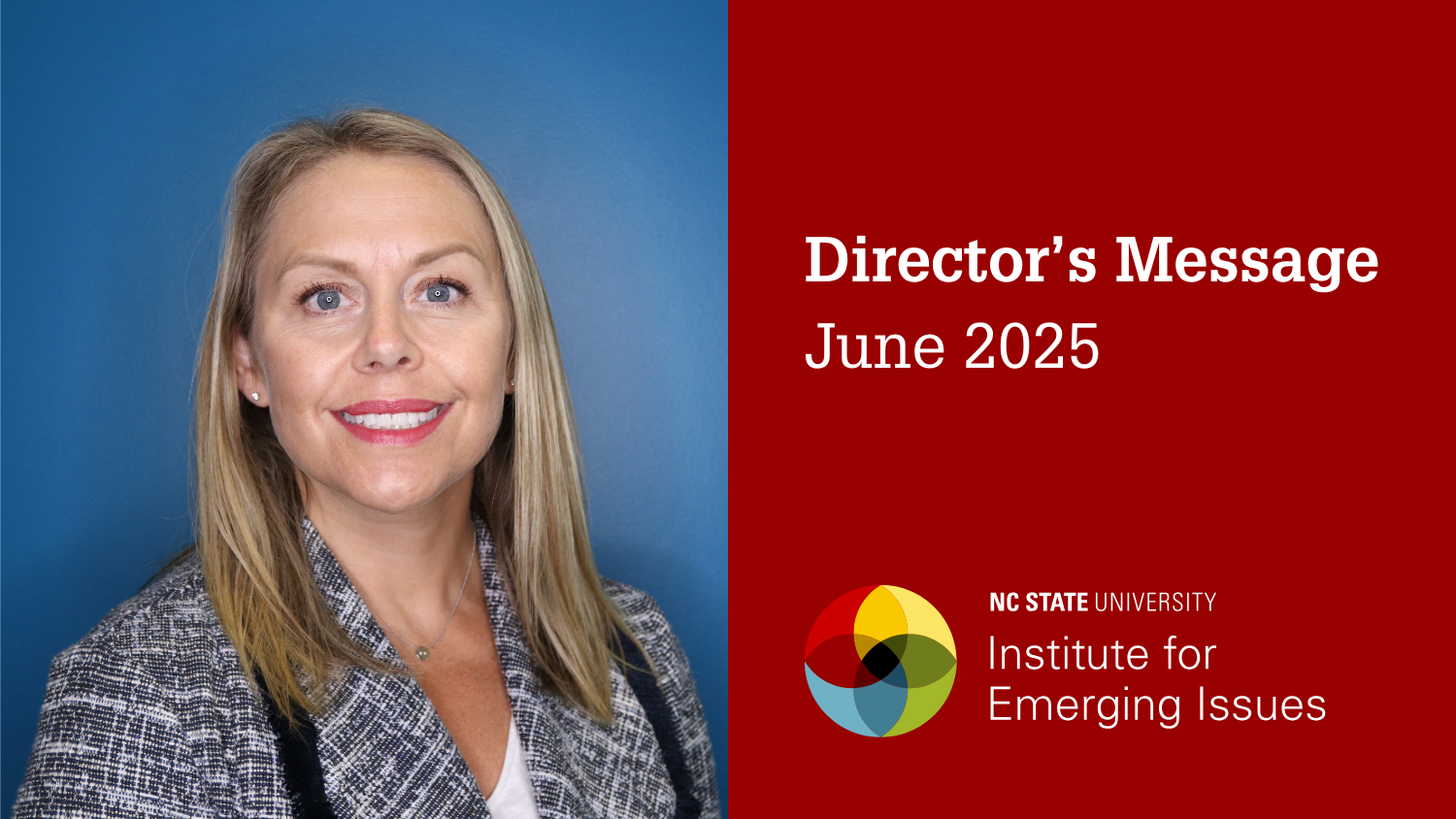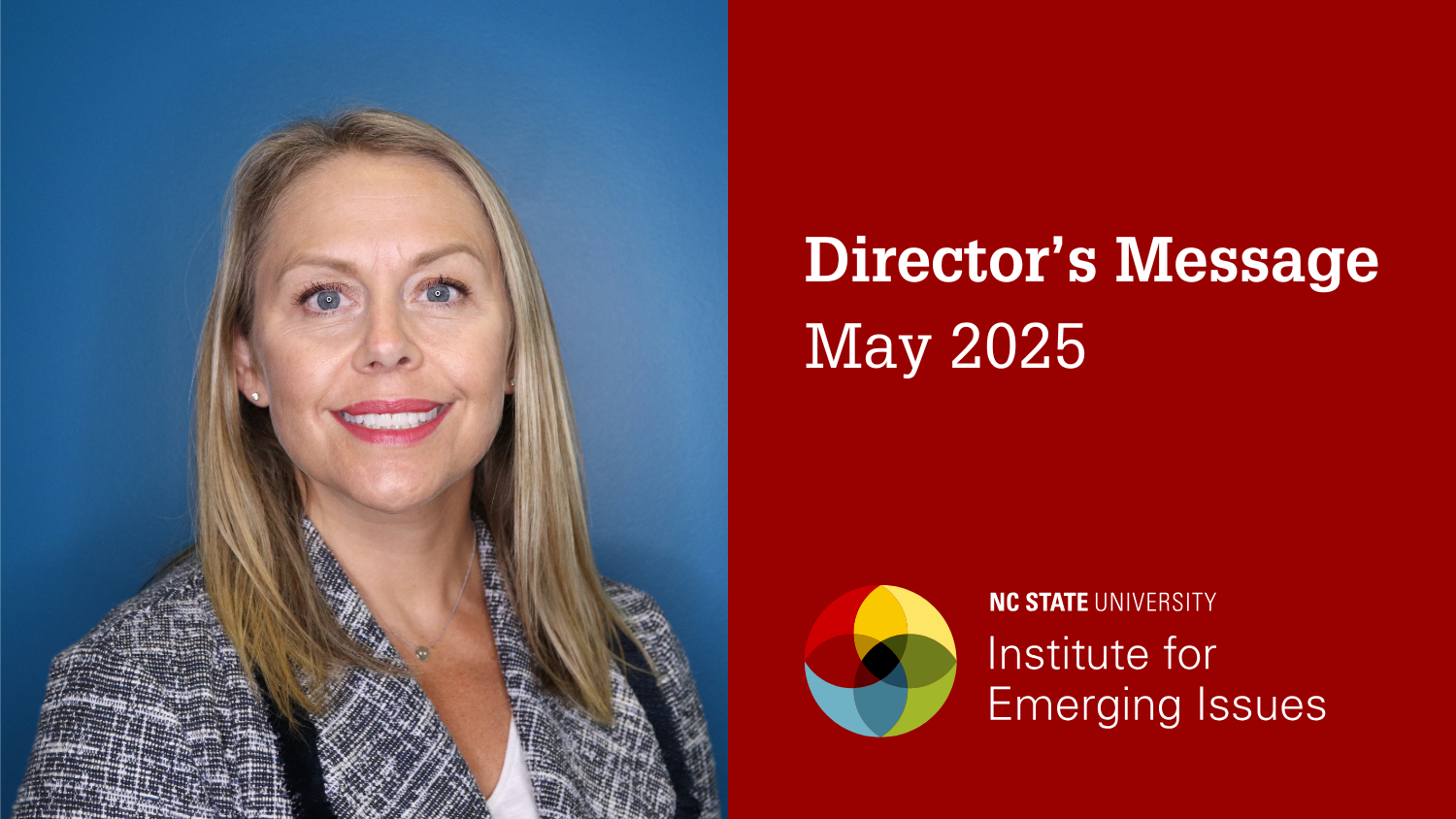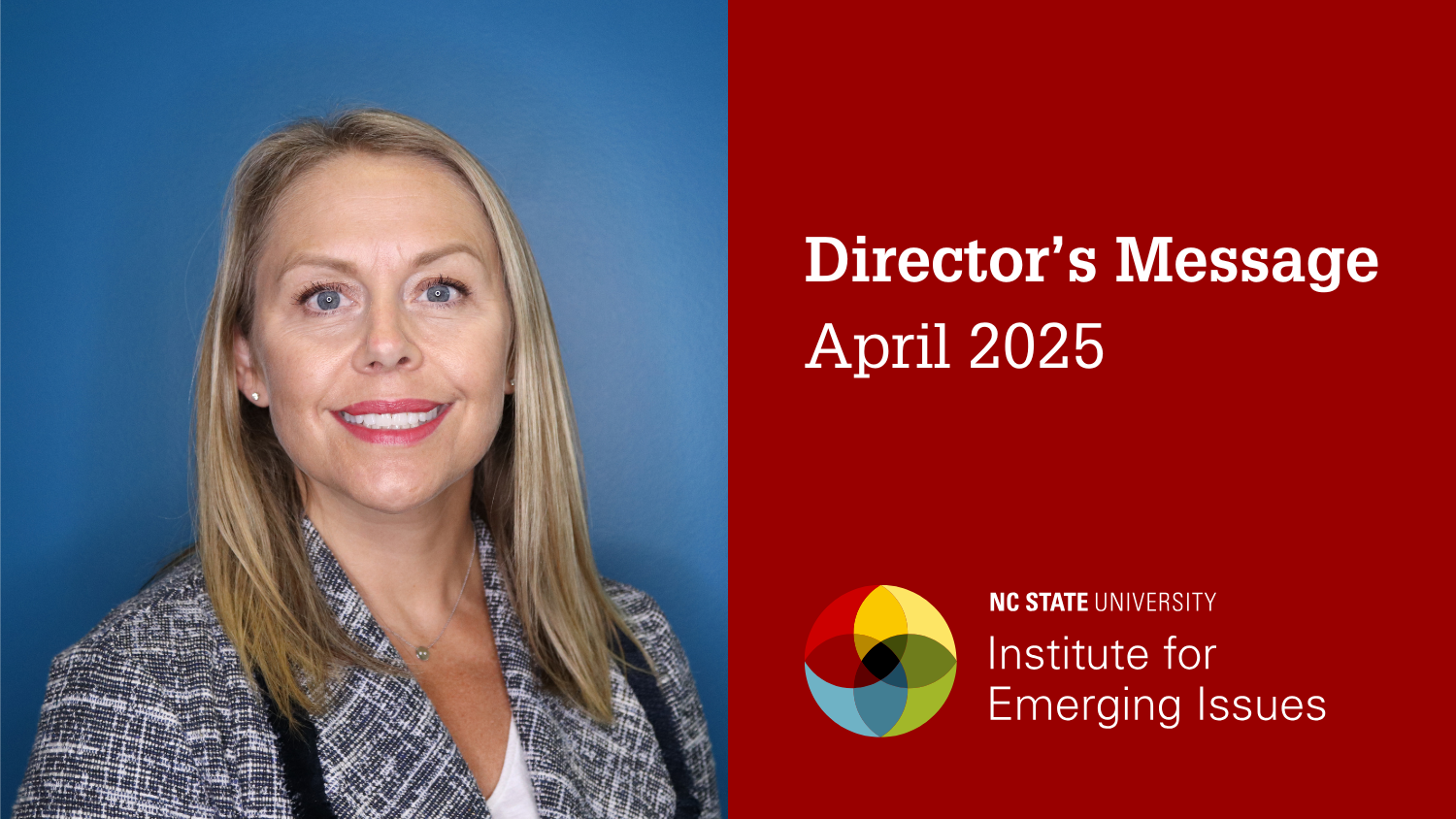Director’s Log | February 2021

What Comes Next?

Without thinking about it last week, I found myself whistling a tune after we finished our Emerging Issues Forum.
I know the whistling was partly relief — we had just completed the longest, most logistically complicated, and first-ever virtual forum in our 35-year history. But then I realized what I was whistling – the tune from a song in Hamilton, “What Comes Next?”[1]
The title is the question we have after every Forum, but it’s even more important with the completion of this one. The February 15-18 “ReCONNECT for the Future” forum was the sixth in a series called ReCONNECT NC, all focused on how we, given all of our divides, can move forward as a state. Can we, as Jim Hansen of PNC Bank described it, “push ourselves out of our own echo chambers”? What are the next things we can do, as Carolina Panthers linebacker Shaq Thompson challenged us, to “learn and grow”?
Our most obvious answer to that question comes in our new report on ReCONNECT NC. The report outlines what we’ve learned, and lifts up five ideas we’ve developed from our conversations, correspondence, workshops and forums with you over the past three years.
Each of the ideas hits on one of the topics we took up since we began ReCONNECT NC in 2018: increasing civic participation; finding new connections between rural, urban and suburban areas; boosting economic mobility for adults; increasing adoption of broadband; and improving access to mental health services.
The ideas themselves are right-sized, using an approach Rich Harwood of the Harwood Institute described in his closing keynote February 18: they all “start small to go big.” Each of the ideas builds off of what Gov. Roy Cooper described as our state’s “resilient spirit.” Each addresses one element of a much larger challenge, with the idea of providing momentum to move forward.
On some of these IEI will play a more prominent role; on others we will be enthusiastic cheerleaders.
Catalyze County-level Digital Inclusion Plans: We’re continuing our work highlighting the importance of communities developing strategies to get broadband into every home. Our BAND-NC program, supported with a mix of private (mostly) and public (some) funding, lays out a goal of every county developing a “digital inclusion plan” – a strategy to systematically get every home connected. Already we have provided grants to 29 organizations working in 39 counties, and 14 have digital inclusion plans underway. We’ll launch another grant cycle next month. Separately, we are working with a bipartisan group of legislators who has asked us to convene a series of discussion on “what comes next” with broadband.
Launch a North Carolina Regional Exchange: So much of what we have learned through ReCONNECT NC is the importance of what Calvin Allen, director of Rural Forward NC, described at the Forum as “bridge building” – across political, racial and income lines – and across geography. The NC Regional Exchange aims to develop connections and empower community leaders to work on and think about the interconnectedness between rural, urban and suburban parts of our state, and then respond in a collaborative way. The starter ingredient of the secret sauce, we believe, could be an amazing base of alumni of “leadership” programs who could pilot the effort. We’ve started tapping into the collective expertise and learnings of Leadership NC, the Rural Economic Development Institute (run out of the NC Rural Center) and the Friday Fellowship (managed from the Wildacres Leadership Initiative) to identify what to include in a regional exchange and explore potential strategies for implementation, deploying their alumni base to jumpstart these conversations across the state. Between them these organizations have more than 2,500 alums. We’ve already heard from others who want to join them. Let’s see if we can launch this in a year.
Commit $2,000 for 2,000: Through ReCONNECT NC, we’ve been impressed with the creativity of communities across the state coming together to connect with each other to solve big challenges. To make a difference, those community efforts need additional people power, and one of the best sources of support is young people power. The $2,000 for 2,000 program aims to significantly increase the number of young people doing “service years” in the state. By increasing the amount of support young people and organizations get, we may be able to build what LEAD for NC director Dylan Russell called at the Forum the “talent pipeline” going into communities. Four million dollars from somewhere (or several “wheres,” could make a big difference.
Scale wraparound services to support higher education attainment: At the Forum, Thomas Stith, president of the NC Community College System, talked about the challenges many students, especially adults, have in getting the additional education credentials they need to support their families. Going back to school means, for many people, finding ways to pay for transportation, utilities, child care and other costs, what many people call “wrap around services.” The state’s myFutureNC commission estimates if our state does nothing we will fall 400,000 short of the workforce we need to fuel our future economy. Creative solutions to wraparound services on our 2-year and 4-year campuses can increase completion rates and shrink that gap.
Increase peer-operated mental health centers: The explosion of mental health challenges during time of COVID-19 has turned an already-existing shortage of mental health capacity into a crisis. We need more trained mental health professionals and more facilities of all sorts to address the problem, but one solution to get more people help sooner is to replicate successful “Peer-Operated Respite” facilities, staffed by people living in recovery with mental illness or substance abuse disorder. Early research shows such facilities can be both effective and cost-efficient. As Cherene Caraco, CEO of the Promise Resource Network, put it during the Forum, “those closest to the problem can be closest to the solution.”
There are dozens more promising approaches underway on a smaller scale across the state. Over the next couple of months we’ll be telling the stories of 26 of them, highlighting the work of the “cohort communities” we have identified at work on each of our big “disconnections.” Together they illustrate a Spanish maxim Matty Lazo-Chadderton shared at the Forum: “in coming together we have power.” We think you will be inspired by them. Individually and collective, they are daily doing the work David Brooks described in his opening keynote as “small, heroic acts.”
As for the five ideas, there’s potential in each of them for participation from a state and local level, from the public, private, education and nonprofit sectors. And there’s potential, if we do these small/big things, that we generate the confidence and trust to do the next small/bigger things. We hope we can start what Rich Harwood referred to as “positive contagion.”
If there’s one thing we all understand now, it’s infection. Let’s start spreading something good.
[1] The title is more relevant than the actual lyrics – in the show, it is King George III puzzling over what the US is going to do now that it has independence!)
- Categories:


